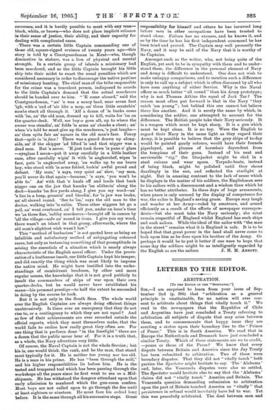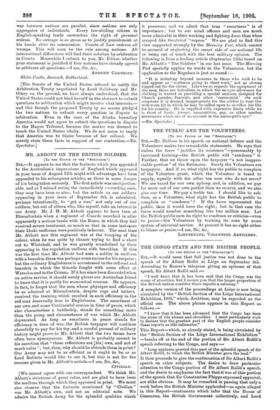[To THY EDITOR OF THE "SPECTATOR.""]
am surprised to learn from your issue of Sep- tember 2nd (p. 306) that " arbitration as a geneial principle is unattainable, for no nation will ever con- sent to arbitrate about things that vitally touch it." ' We read in the newspapers that the Republics of Chile and Argentina have just concluded a Treaty referring to arbitration all subjects of dispute that may arise between them, and to commemorate that happy issue they are erecting a statue upon their boundary line to the " Prince of Peace." This is in South America. We read that in Europe the Netherlands and Denmark have just concluded a similar Treaty. Which of theie statements are we to credit, —yours or those of the Press ? We know that every dispute between Britain and America since the Jay Treaty has been submitted to arbitration. Two of these were boundary disputes. That they did not " vitally touch " both parties the Spedator might hesitate to say. ' The Alabama' and, later, the Venezuela disputes were also so settled. The Spectator would hesitate also to say that the Alabataa' claims did not " vitally touch " America and Britain. "The Venezuela question demanding submission to arbitration upon.the part of Britain touched America so " vitally " that persistence in refusal would inevitably have led' to war. --Yet this was peacefully arbitrated. The duel between men and
war between nations are parallel, since nations are only aggregates of individuals. Every law-abiding citizen in English-speaking lands surrenders the right of personal redress. No outrage is so gross as to justify punishment at his hands after its commission. Courts of Law redress all wrongs. This will soon be the rule among nations. All international differences will find their solution by arbitration in Courts. Meanwhile I submit to you, Mr. Editor, whether your statement is justified if four nations have already agreed to arbitrate all questions.—I am, Sir, &c.,
ANDREW CARNEGIE.
[The Senate of the United States refused to ratify the Arbitration Treaty negotiated by Lord Salisbury and Mr. Olney on the ground, we have always understood, that the United States could not bind herself in the abstract to submit questions to arbitration which might involve vital interests,— and this though the proposed Treaty by no means pledged the two nations to submit every question in dispute to arbitration. Even in the case of the Alaska boundary America would not agree to submit the questions in dispute to the Hague Tribunal, because the matter was deemed to touch the United States vitally. We do not mean to imply that America was to blame because of her refusal. We merely state these facts in support of our contention.—ED. Spectator.]











































 Previous page
Previous page